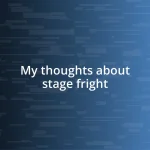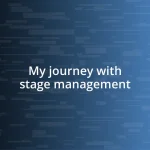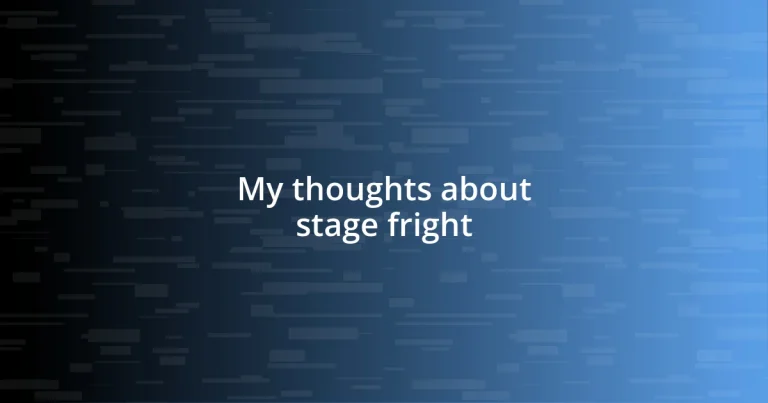Key takeaways:
- Stage fright symptoms include both physical reactions (e.g., racing heartbeat) and mental challenges (e.g., negative thoughts), highlighting the importance of addressing both aspects for effective management.
- Common causes of stage fright are fear of judgment, lack of preparation, and personal emotional stakes, each contributing to heightened anxiety before performances.
- Strategies for overcoming stage fright include mental preparation techniques like visualization, mindfulness practices, deep breathing, and seeking professional support, all of which help transform anxiety into confidence.
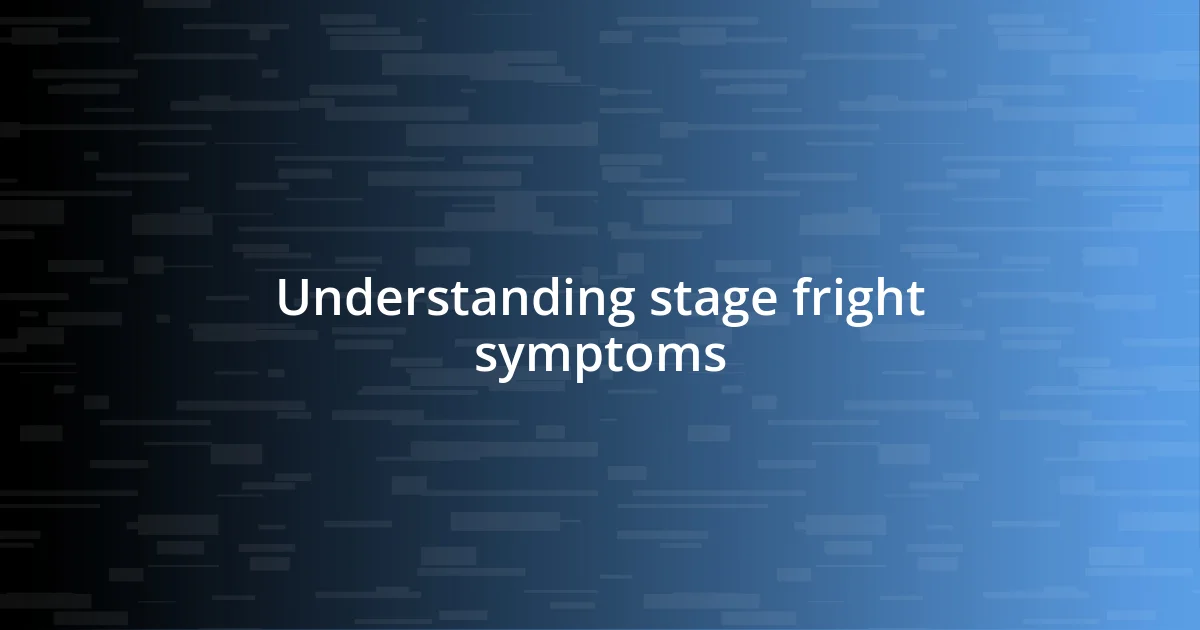
Understanding stage fright symptoms
When it comes to stage fright, the symptoms can vary widely from person to person. Personally, I used to experience a racing heartbeat and sweaty palms at the mere thought of stepping onto a stage. It begged the question: Why do our bodies react so intensely to performing in front of others?
For some, the feelings can escalate into a full-blown panic attack, including shortness of breath or dizziness. I recall a time when I struggled to take deep breaths before my big moment. It made me wonder—how many others feel this way and how does it affect their performance?
It’s also important to recognize the mental symptoms of stage fright. I often found myself battling negative thoughts and self-doubt, wondering if I’d forget everything I was supposed to say. Do you ever feel like your mind is playing tricks on you, amplifying your fears? This internal dialogue can be just as debilitating as any physical symptom, reminding us that stage fright is as much about our mindset as it is about our physical reactions.
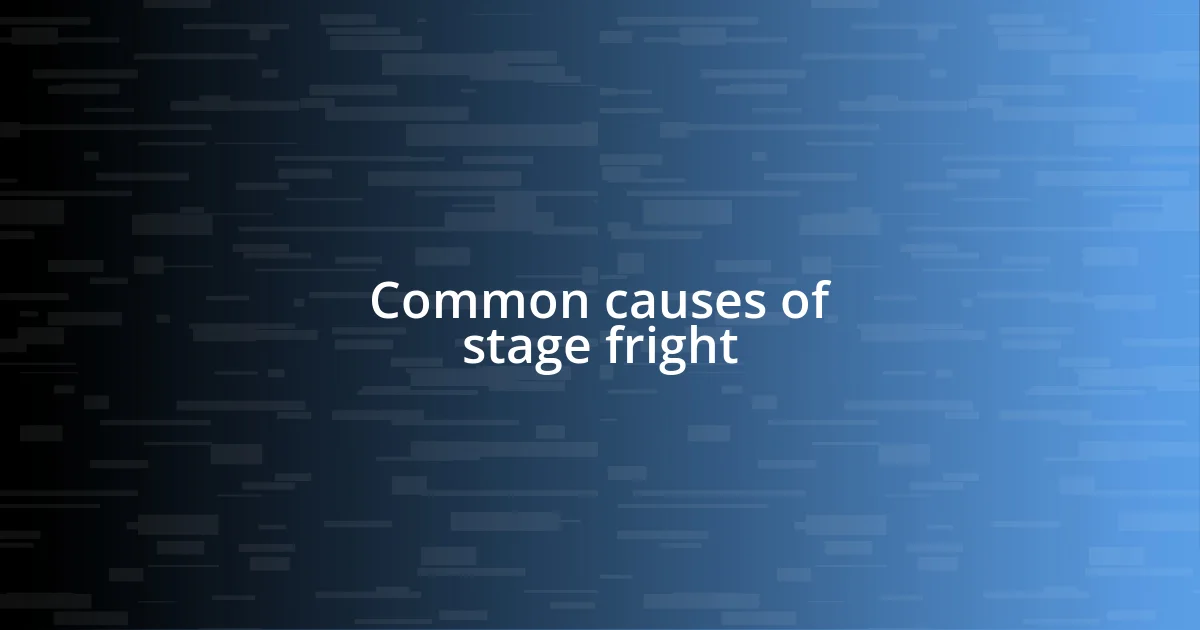
Common causes of stage fright
When I think about stage fright, several common causes come to mind, primarily rooted in fear of judgment. It’s daunting to face an audience, and I remember feeling that overwhelming sense of vulnerability, as if every eye were scrutinizing my every move. The fear of making mistakes and the subsequent embarrassment can be powerful deterrents for many performers.
Another significant cause is lack of preparation. I’ve had experiences where I practiced tirelessly but still felt unready. That nagging self-doubt can eat away at your confidence, making you question whether you really know your material well enough. Have you ever walked on stage, second-guessing every detail, wondering if you’re adequately prepared to deliver? It’s a common struggle that can leave even the most seasoned speaker feeling shaky.
Lastly, it’s important to consider personal stakes. The meaning behind the performance can amplify anxiety levels. For instance, I once had to present a project I poured my heart into, which made me feel incredibly pressured to succeed. It struck me then that the emotional investment in the performance can magnify our fears. The question arises: can we shift that energy into excitement instead of fear?
| Cause | Description |
|---|---|
| Fear of Judgment | Worry about how the audience perceives you and concerns about making mistakes. |
| Lack of Preparation | Feeling unprepared, leading to self-doubt and insecurity about your material. |
| Personal Stakes | High emotional investment in the performance, increasing pressure to succeed. |
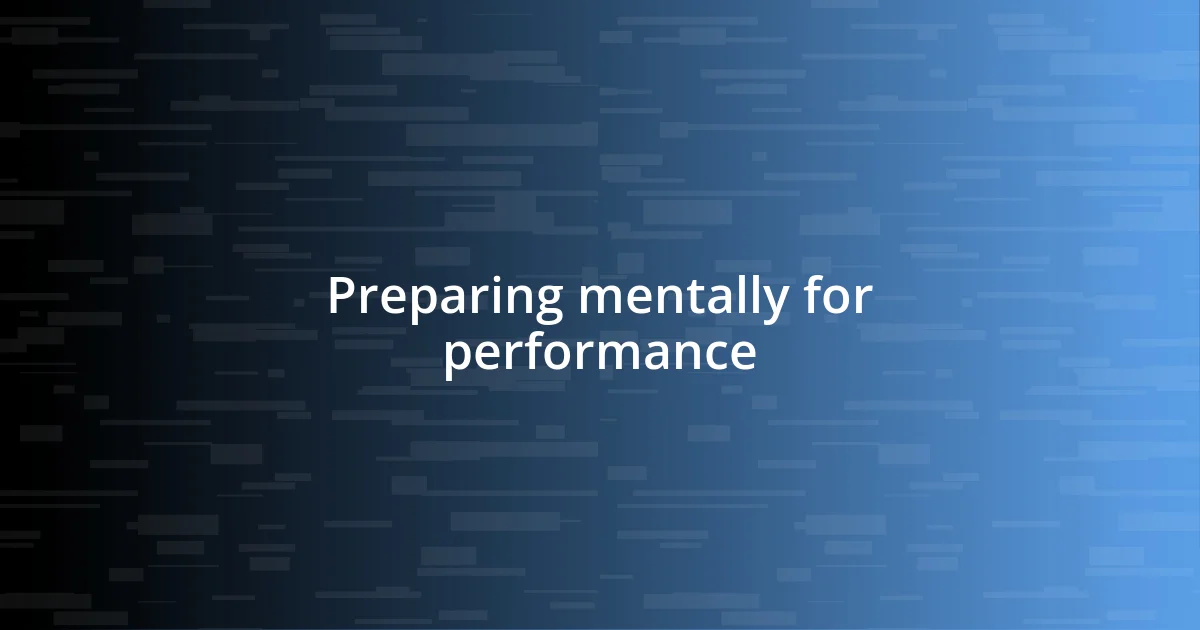
Preparing mentally for performance
Preparing mentally for performance is a crucial step I often emphasize. Before stepping on stage, I find that visualization can be an immensely powerful tool. Picturing myself delivering a flawless performance helps to ease my mind and reframe any negative thoughts. I remember a time when I visualized a cheering audience, and it drastically reduced my anxiety—it’s like tricking my brain into believing everything will go smoothly.
To enhance mental preparation further, I recommend trying out a few techniques:
- Mindfulness Meditation: Taking a few moments to focus on my breath allows me to ground myself and calm my racing thoughts.
- Positive Affirmations: Each performance, I remind myself of my strengths and past successes, which uplifts my confidence.
- Practice under Pressure: I often rehearse in environments that mimic an audience setting, such as in front of friends or family. It builds familiarity and reduces fear of judgment.
- Goal Setting: I set realistic objectives for what I want to achieve during my performance, shifting my focus away from potential mistakes.
Each of these strategies not only prepares my mind but also transforms the nerves into excitement, making for a much more enjoyable experience on stage.
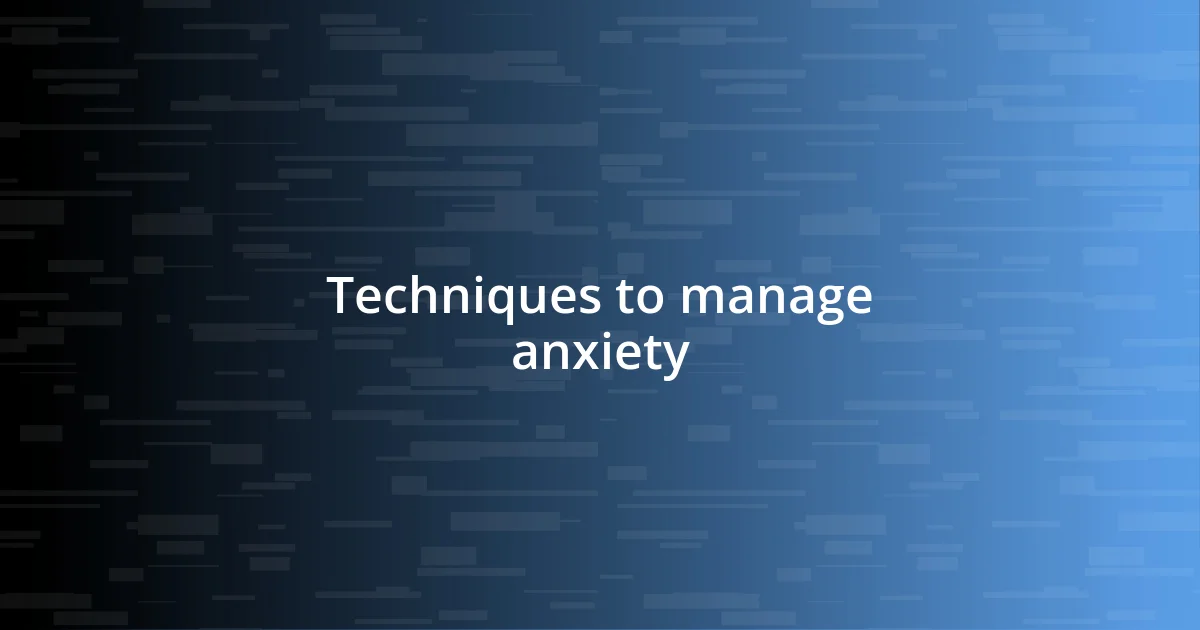
Techniques to manage anxiety
One of the techniques I find incredibly beneficial is deep breathing. Before I step on stage, I take a few moments to inhale deeply, holding it for a count of four, then exhaling slowly. This simple act has a calming effect that never ceases to amaze me. Have you ever noticed how a few slow, deliberate breaths can shift your entire perspective? It’s as if I’m physically releasing the tension that builds up before a performance.
Journaling is another technique that I’ve embraced in managing anxiety. I often write down my fears and concerns about an upcoming performance. Expressing these thoughts on paper helps me gain clarity and perspective. I remember a time when I poured my worries into my journal, and afterward, I felt lighter and more in control. It’s remarkable how taking a moment to reflect and articulate your feelings can transform anxiety into a pathway for growth.
Finally, I’ve discovered the value of connecting with the audience before I perform. I try to engage with a few friendly faces in the crowd—it feels more like a conversation than a performance. This approach humanizes the experience, reducing feelings of isolation that can heighten anxiety. Have you tried making eye contact and smiling at someone in the audience? I often find that doing this not only eases my nerves but also creates an instant connection that fuels my confidence on stage.
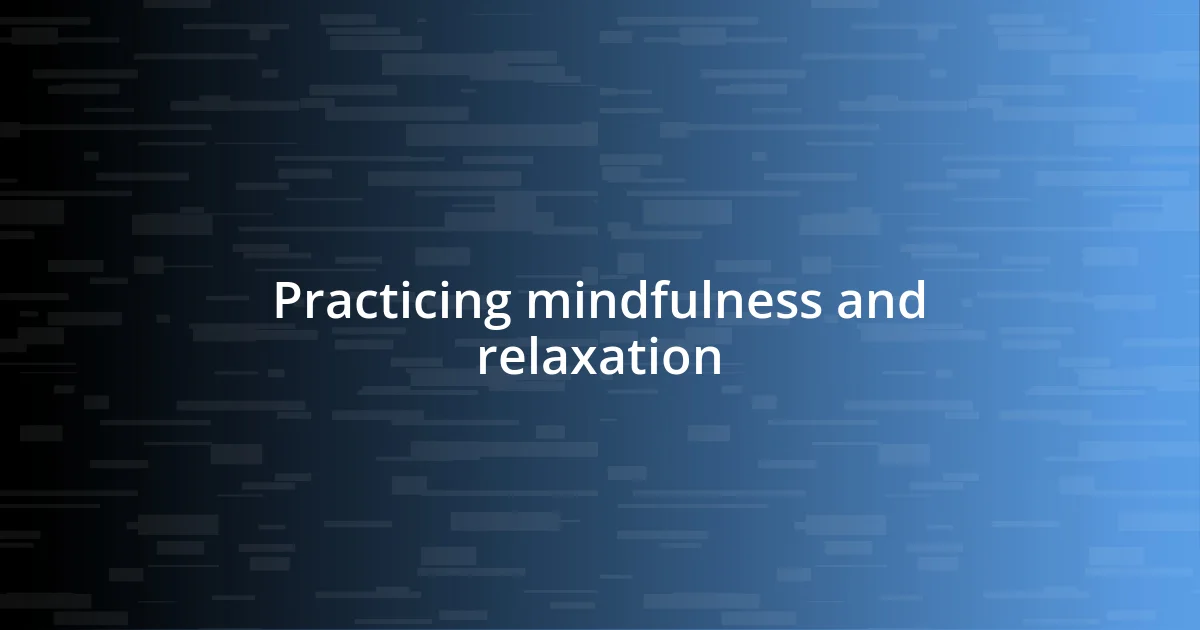
Practicing mindfulness and relaxation
Practicing mindfulness has become a cornerstone of my preparation routine. I vividly recall a moment when I sat in silence backstage, focusing solely on my breathing. It felt transformative, as the icy grip of stage fright began to melt away. Have you ever experienced that serene clarity that arises when you truly center yourself? For me, that focused stillness not only anchored my thoughts but also allowed a wave of confidence to wash over me.
In addition to mindfulness, I’ve found that gentle stretching can be a surprisingly effective relaxation technique. Before a performance, I sometimes do simple neck rolls or shoulder stretches. It’s funny how loosening up physically can lead to a lighter mental state. Do you ever notice how a little movement can shift your mood? I remember a performance where I felt particularly tense, but those few minutes of stretching made me feel untethered, ready to embrace the stage.
Incorporating relaxation techniques like progressive muscle relaxation has been an eye-opener for me as well. I start by tensing and then releasing each muscle group, working my way from my toes to my head. I still vividly recall the first time I tried this approach; it felt as if I was shedding layers of stress. Have you ever felt that incredible release when you let go of built-up tension? It’s a gentle reminder that relaxation isn’t just a concept—it’s a practice that can fundamentally change how we face our fears.
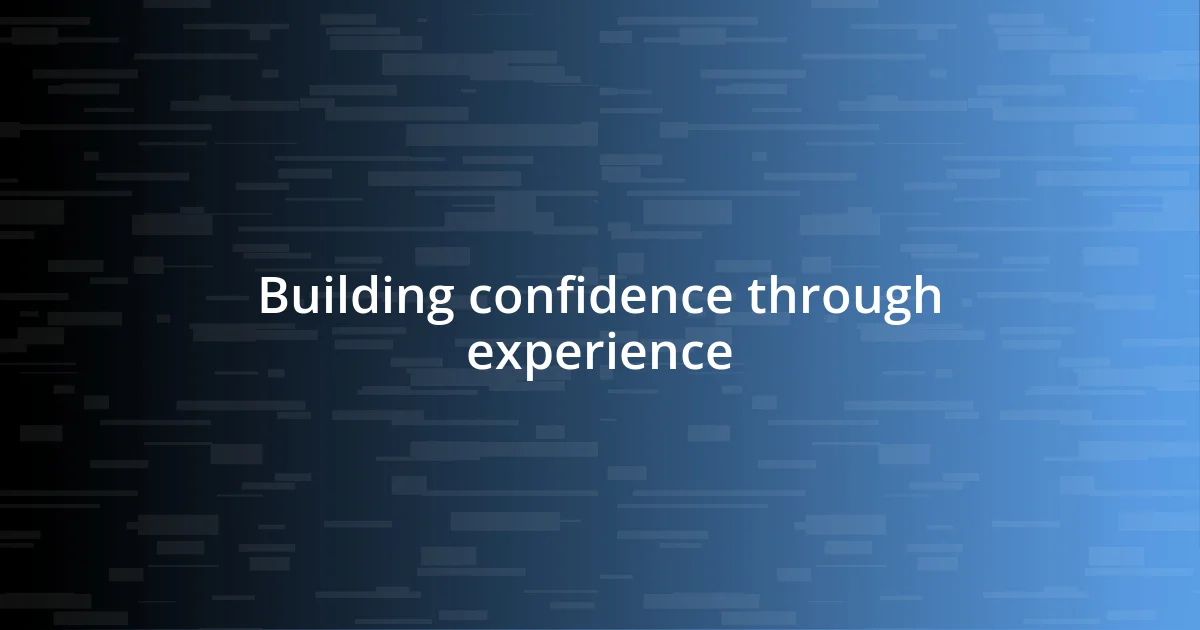
Building confidence through experience
I’ve come to realize that experience is a powerful teacher. Every time I step on stage, I’m not just facing an audience; I’m confronting my past performances—both the highs and the lows. I remember a particularly nerve-wracking event where everything seemed to go wrong, yet somehow, I made it through. That experience taught me resilience. With each performance, I slowly learned that overcoming challenges builds not just skill, but confidence too.
Revisiting the memories of successful moments fuels my belief in myself. There’s something incredibly empowering about recalling a time when I received a warm round of applause or a genuine compliment. I cherish those moments because they remind me of my ability to connect with an audience. Have you ever thought back to a time when you performed well? That rush of pride can serve as a comforting anchor when doubts creep in.
I’ve found that the more I perform, the less daunting the stage feels. Early on, I experienced this overwhelming fear, but as I faced it repeatedly, I developed a rhythm. One night stands out vividly when I shared a personal story that resonated deeply with the audience. The laughter and nods of understanding became an instant reassurance. This growing familiarity with my own stage presence transforms uncertainty into excitement, demonstrating that each experience enriches our confidence. Isn’t it fascinating how embracing the discomfort can lead to powerful growth?
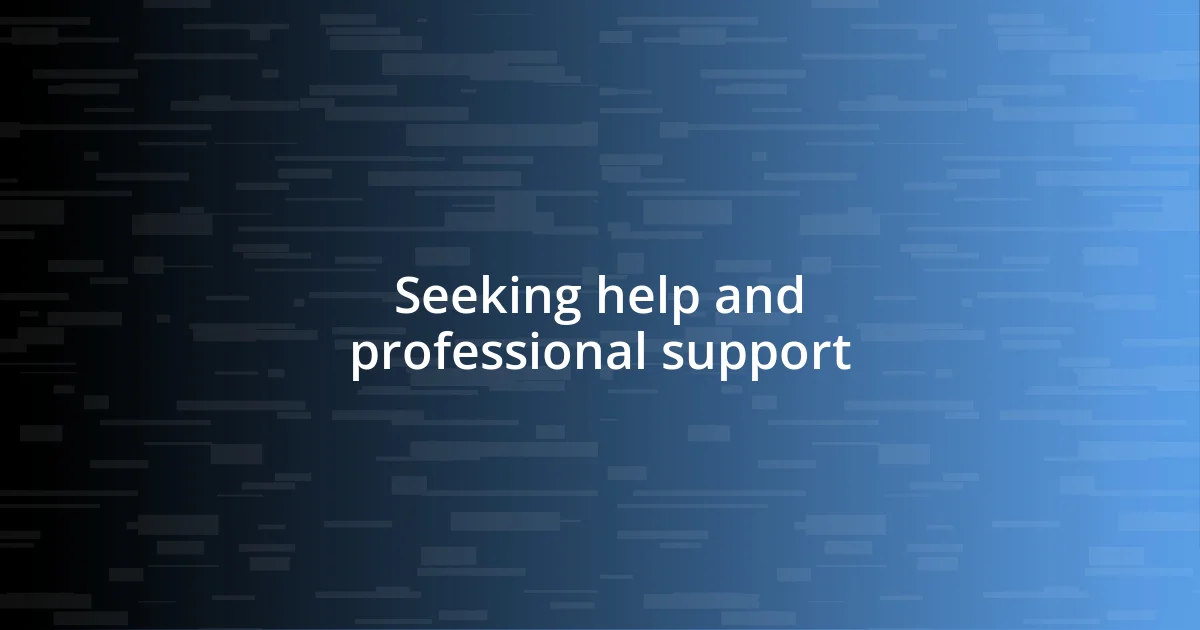
Seeking help and professional support
When I first acknowledged my stage fright, I felt an overwhelming urge to seek help. It was a daunting realization, but reaching out was a turning point. I remember signing up for a workshop led by a professional who specialized in performance anxiety. The insight gained from shared experiences in a supportive environment was invaluable—have you ever felt that rush of relief when you realize you’re not alone in your struggles?
Looking back, I can’t stress enough how therapeutic it was to speak to a counselor who understood my fears. They helped me unpack the underlying causes of my anxiety, and through our sessions, I gained tools to cope. I still recall one specific session where I was encouraged to visualize my success on stage. Just that simple mental exercise illuminated the path from fear to empowerment. Have you thought about how powerful visualization can be in reshaping your mindset?
Seeking professional support doesn’t just provide strategies; it fosters a sense of community. After connecting with my therapist, I also found a local group focused on public speaking. Sharing my journey with others in similar situations made me feel heard and validated. Every time we exchanged stories, it reinforced the notion that vulnerability leads to growth. Have you ever found strength in a shared experience? That camaraderie made my stage fright feel less like a solitary battle and more like a shared journey towards confidence.







